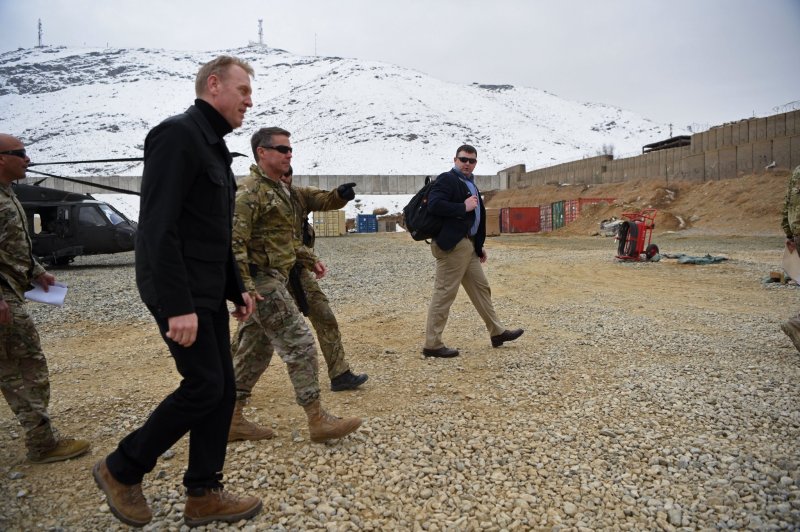Acting U.S. Defense Secretary Patrick Shanahan (L) walks with military members in Afghanistan on February 11, 2019. On Friday, the International Criminal Court unanimously rejected a prosecutor's request to investigate alleged U.S. war crimes in Afghanistan in 2002. Photo courtesy U.S. Department of Defense
April 12 (UPI) -- The International Criminal Court dropped plans on Friday to investigate alleged war crimes of U.S. military and intelligence personnel in Afghanistan.
The court, based in The Hague, Netherlands, unanimously rejected a prosecutor's request to proceed with a probe of possible war crimes and crimes against humanity following the U.S.-led invasion of Afghanistan in early 2002. The military action sought members of al-Qaida who participated in the Sept. 11, 2001, attacks on the United States, and the Taliban members who protected them.
In 2017, ICC Chief Prosecutor Fatou Bensouda sought authorization to begin the investigation. Last week, she was denied entry to the United States, following a U.S. government revocation of visas to ICC representatives.
The ban is directly related to the now-closed investigation of U.S. actions in Afghanistan. The United States is not an ICC member and does not recognize its authority.
"The U.S. has not joined the ICC because of its broad, unaccountable powers, and its threat to our sovereignty," Secretary of State Mike Pompeo said on March 15. "We will protect our citizens."
An ICC statement on Friday cited a lack of cooperation from all sides, leading to the rejection of the investigation.
"The [ICC pre-trial] Chamber noted the time elapsed since the opening of the preliminary examination in 2006 and the political changing scene in Afghanistan since then, the lack of cooperation that the prosecutor has received and which is likely to go scarcer should an investigation be authorized, hampering the chances of successful investigation and prosecution, as well as the need for the Court to use its resources prioritizing activities that would have better chances to succeed," the statement said in part.
Human rights advocates regarded the decision as submission to the United States.
"With its decision today, the International Criminal Court sends a dangerous message, that bullying wins and that the powerful won't be held to account," said Katherine Gallagher of the Center for Constitutional Rights, headquartered in New York.
President Donald Trump praised the decision and derided the ICC in a statement on Friday.
"This is a major international victory, not only for these patriots, but for the rule of law. We welcome this decision," the White House statement said in part. Since the creation of the ICC, the United States has consistently declined to join the court because of its broad, unaccountable prosecutorial powers; the threat it poses to American national sovereignty; and other deficiencies that render it illegitimate."















